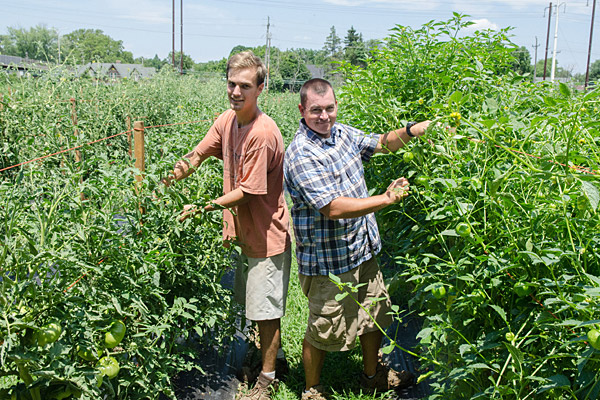
Native Delaware: Seeds of success
UD Garden for Community intern helps others while growing job skills
10:01 a.m., July 30, 2012--Owen Cass wants to be a farmer when he gets out of college. While most people would assume that’s not an unusual aspiration for a student in the University of Delaware's College of Agriculture and Natural Resources, it actually is. Careers in research, agri-business, natural resources management and veterinary science are more typical choices.
What’s even more out of the ordinary is that Cass comes from a suburban background. He doesn’t recall his parents growing so much as a tomato plant when he was a child in Bryn Athyn, Pa.
People Stories
'Resilience Engineering'
Reviresco June run
But this 22-year-old is getting plenty of experience growing tomatoes – and squash, sweet corn, cukes, peppers and much more – in UD’s Garden for the Community.
Cass is a summer intern for this one-third acre garden that produced three tons of vegetables and herbs last year, all of which were donated to the Food Bank of Delaware.
The garden, located on UD’s Newark Farm, is managed by Mike Popovich, a Cooperative Extension associate.
Now in its fourth year, the garden does good things for low-resource Delawareans who may not have the opportunity to eat many fresh vegetables. “We’re so excited to get fresh-picked produce out to our hunger relief partners in the community,” says Kim Kostes, communications director of the Food Bank. “As soon as Owen or Mike arrive with the day’s harvest, we get it right back out the door.”
The garden also does good things for students like Cass, who was eager to show off this season’s crops on a recent 95 degree day. Despite the heat, Cass vigorously strode between the garden rows, pointing out pumpkins he had planted the week before; hibiscus-like blooms on okra plants; Japanese beetle damage on basil; and the “Florida weave” style of staking used on heirloom tomato plants.
(In the Florida weave technique, you drive a stake between every two or three plants and attach a string at the end of each row. You then weave the string between the plants.)
“Even during a bad thunderstorm the other night, the tomatoes stayed upright,” says Cass. “Our peppers fell over but some international students volunteered the next day and helped to get them re-staked.”
Farming requires knowledge not just about combating pests and re-staking plants but also about managing people. Cass hopes to own his own farm, in which case he may have dozens of employees under his direction. This summer, working with 200-plus garden volunteers, he is getting plenty of supervisory experience. A half dozen or so core volunteers show up every Saturday; others, like the international students, help out just once.
“I can’t believe the amount that I’m learning,” says Cass. “Mike lets me make a lot of decisions on my own, whether it’s managing the volunteers or choosing which kind of seeds to plant for our second season of crops.”
“I also get to learn from Extension and college experts,” he adds. “Nancy Gregory [an Extension plant diagnostician] was out in the garden recently because she needed downy mildew samples for a research project. She didn’t have enough in her own test plots but, unfortunately, we had it on our cucumbers.”
Despite a bit of downy mildew and Japanese beetles the Garden for the Community always enjoys high yields. Popovich is the first to admit he has plenty of advantages over the home gardener. “The UD community gets very excited about this garden,” says Popovich. “I’m fortunate to have a steady stream of Cooperative Extension professionals and UD agriculture researchers popping by to give advice and lend a hand.”
“And Owen has been tremendously helpful with planting, weeding, harvesting and other chores," Popovich says. "He has taken an immense amount of initiative early on.”
“Not one nuisance insect or weedy plant goes unnoticed by him,” he adds. “Owen checks with college professionals -- and his smart phone -- to identify bug and disease issues. On one occasion, I saw him spend 20 minutes trying to catch a single squash vine borer. That’s the type of dedication I like to see in an intern.”
Cass will be extra busy in the weeks ahead, getting the garden in picture-perfect condition for the Aug. 9 Evening in the Garden, a benefit for the Food Bank of Delaware. Held under a tent, adjacent to the Garden for the Community, the event features fresh-from-the-garden food, fine wine, live entertainment and garden tours.
The meal will be prepared by students from the Food Bank’s Culinary School. “At the beginning of the season, Mike connects with us and makes sure to plant the crops that the students will need for their recipes,” says Kostes. “This year’s menu includes tri-colored bruschetta, roasted vegetables, salmon with tomatillo sauce, and potato and goat cheese salad.”
Tickets for Evening in the Garden cost $40, or $15 per student with ID. After Aug. 2, ticket prices increase to $50, and $25 per student. Call Kostes at 444-8074 or email her at kkostes@fbd.org.
Article by Margo McDonough
Photo by Danielle Quigley








